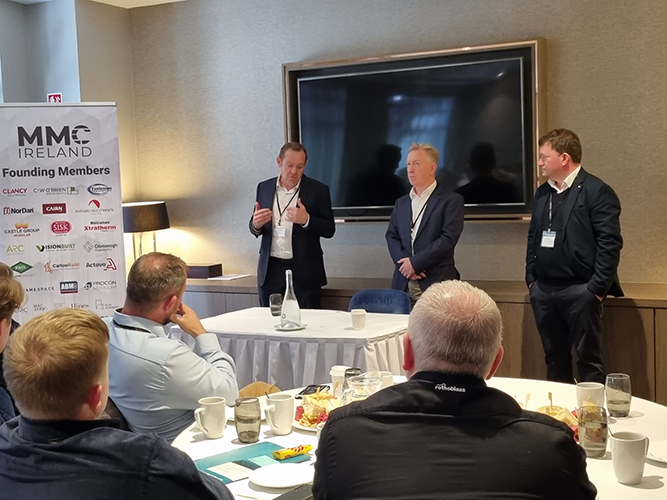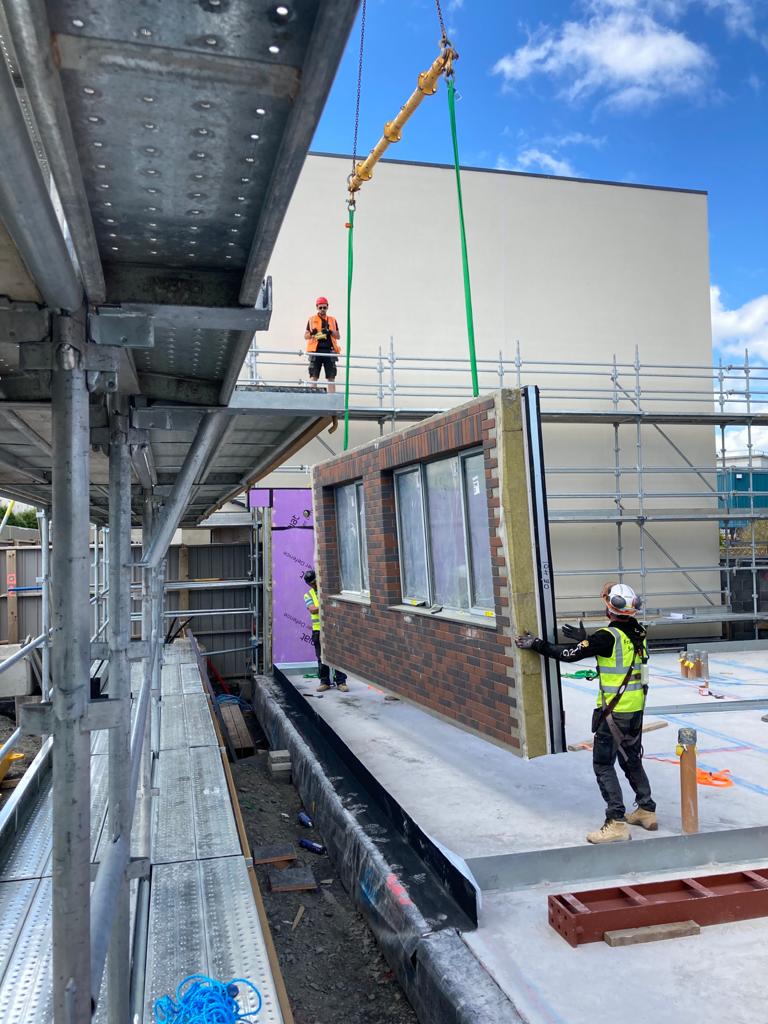– Leading construction and offsite firms launch MMC Ireland to champion the development of modern methods of construction In Ireland
– “Collaboration at this scale has the potential to have a huge impact on MMC adoption across Ireland”
Some of Ireland’s best-known construction brands are among the founding members of new industry body MMC Ireland, which has been established to represent those involved in the planning, design, procurement or delivery of offsite and other modern methods of construction (MMC) in Ireland.
In response to delivery challenges, the Irish government has committed to enabling a more efficient and sustainable approach to the design, construction and operation of buildings. The new body states that MMC will play a vital role in helping the government meet ambitious targets set out under both the National Development Plan and the National Planning Framework, and increasing MMC adoption is critical to the post-pandemic recovery of Ireland’s built environment, economy and communities.
MMC Ireland
MMC Ireland is a collaboration of industry talent and experience, working in partnership to gather insights, and the team will work closely with stakeholders from the public and private sectors and academia to ensure those insights feed into relevant policymaking.
The genesis of the organisation can be traced back to a gathering in 2019 where the chairman of both Tide Construction & Vision Modular Systems, John Fleming, inspired the industry with a vision of ‘Rebuilding Ireland through Modular Construction’
Strong knowledge base
Speaking about the launch of MMC Ireland, co-founder Arthur O’Brien, Managing Director, C+W O’Brien Architects, commented, “Having been involved in the design of MMC projects for several years, I am acutely aware of the challenges project owners face and these challenges are best tackled together. Arthur O’Brien said. “I have been humbled by the strength and knowledge base of the founding members in recent months, and by harnessing this strength and knowledge, we can drive this sector forward.”
MMC Ireland board members
The newly-elected members’ board includes Declan Wallace, Evolusion Innovation; Pat Kirwan, C+W O’Brien Architects; Tony McLoughlin, Glenveagh Properties plc; Eoin Waldron, Castle Modular; Ger Fahey, Horizon Offsite Ltd; Richard Walsh, O’Dwyer Steel; and Kevin Loftus, Cairn Homes plc.
Speaking at the announcement of the new board, Declan Wallace, CEO, Evolusion Innovation and newly-elected board member, emphasised that the overarching objectives of the body are to develop and promote Ireland’s MMC sector in order to build knowledge and awareness of the products and systems on offer in Ireland. “Moreover, our members – through engagement with all stakeholders, including relevant government departments and building control authorities – are committed to ensuring a regulatory environment that addresses compliance, testing, certification, quality and other obstacles to MMC adoption.”
Head of MMC Delivery and board member at C+W O’Brien Architects Pat Kirwan added, “It has been proven that MMC can lead to more efficient and effective construction methodologies, which help to reduce the carbon footprint of the built environment. Through the establishment of MMC Ireland, the construction industry now has a shared voice to develop a coordinated response to the many challenges we face, such as a severe housing crisis and climate change.”
MMC Ireland founding members
In addition to the aforementioned board members, founding members of MMC Ireland include Clancy, NorDan Vinduer, Peppard Investments Limited, John Sisk & Son Ltd, Xtratherm, Errigal, Arc Engineering Ltd, Vision-Built, John Paul Construction, CarlowBuild, Actavo, Framespace Solutions, ABM Design and Build Ltd, Procon Modular, LMC Group Ltd, Mac Zero Modular Buildings, Hines Ireland, HLM Architects, Saint-Gobain Ireland, Platt Reilly, CPAC Modular, Rothoblaas srl, PETRUF Consulting Structural Engineers, Steelframe (part of Montane Developments) and Visor MMC.
About MMC Ireland
Construction in Ireland, and indeed globally, is in transition at present. Innovation and collaboration will be key to building a more effective and sustainable sector. MMC Ireland, as an industry representative body, has the ability to collaborate with all key stakeholders and governmental bodies, including the recently established Construction Technology Centre and the MMC Innovation and Demonstration Park.
MMC Ireland encompasses the seven established categories of MMC, namely: volumetric modular, structural panelised, offsite components, additive manufacture, non-structural assembles and sub-assembles, offsite building material improvements and onsite process improvement.
Further information about MMC Ireland is available at https://mmcireland.ie
You may also be interested to read
Light Gauge Steel – Framespace Solutions
“Pipeline certainty is key to offsite sector having the capacity to meet market needs”
Declan Murtagh, CEO of LGS structure manufacturer Framespace Solutions, believes the Irish off-site construction sector is well placed to help meet the output goals of the Housing for All strategy, but manufacturers need a secure pipeline of work to give them the confidence to make the necessary investment.





